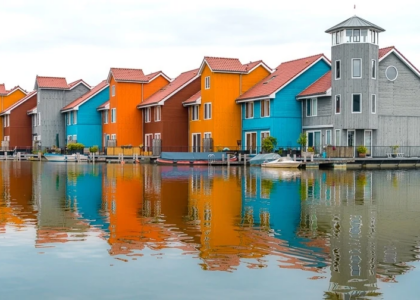the Dutch and Irish Education Systems
Welcome to our guide on the Dutch and Irish education systems for expat families! If you are considering a move to either the Netherlands or Ireland, or if you have recently relocated to one of these countries, it is essential to understand the education system to make informed decisions regarding your children’s schooling.
This guide aims to provide you with a clear comparison of the Dutch and Irish educational systems, highlighting their similarities and differences. By understanding these systems, you can better navigate the process of enrolling your child in a suitable school and ensure they receive a high-quality education.
Why compare the Dutch and Irish education systems?
Both the Netherlands and Ireland offer excellent educational opportunities for expat families, but there are distinct differences between the two systems that may influence your decision-making process. Understanding these differences can help you identify the best fit for your child’s needs and expectations.
What can expat families expect from this guide?
In this guide, we will explore key aspects of the Dutch and Irish education systems, such as the structure and organization, legal and administrative requirements, school types and curriculum, teaching methods and philosophies, assessment and grading systems, support services for expat families, integration and cultural considerations, parental involvement, and personal experiences from other expat families.
Who is this guide for?
This guide is specifically designed for expat families who are considering or have already relocated to either the Netherlands or Ireland. Whether you are an expat parent researching schools or a family in the midst of navigating the education system, this guide will provide you with valuable insights and information to assist you in making informed choices.
How to use this guide?
To maximize the benefits of this guide, we recommend reading it comprehensively from start to finish. However, if you have a specific topic in mind, feel free to jump directly to that section and explore the areas that interest you the most. Our aim is to provide you with a holistic understanding of the Dutch and Irish education systems to empower you in your decision-making process.
We hope you find this guide helpful and informative as you navigate the world of education in the Netherlands and Ireland. Let’s dive in!
Overview of the Dutch Education System
The Netherlands boasts numerous international schools offering the International Baccalaureate (IB) curriculum, serving a diverse and global-minded student community. Ranging from Amsterdam to The Hague, these schools provide a rigorous and comprehensive education, ensuring students are well-prepared for the demands of our interconnected world.
The pinnacle of the International Baccalaureate program, the Diploma Years, are recognized for their academic rigor and complexity. Catering to students aged 16-19, this two-year program is designed to challenge students acadically and personally, fostering independent thinking and research skills. It includes six subject groups, Theory of Knowledge (TOK), Creativity, Activity, Service (CAS) and the Extended Essay (EE). An essential component of this program is the Internal Assessment (IA), a series of student-initiated projects across various subjects that contribute significantly to the final IB score.
Given the complexity of the IA, many students seek external assistance to better understand and navigate this process. The IB IA Writing Service is a valuable resource for students, providing research assistance, guidance on structuring their work, and proofreading services. The support from such a service can be instrumental in helping students to deliver high-quality projects, ensuring they maximize their potential during the challenging Diploma Years.
The Dutch education system is renowned for its high standards and innovative approach to learning. Whether you are a newcomer or an expat family considering moving to the Netherlands, it is helpful to understand the structure and organization of the Dutch education system to make informed decisions about your child’s education.
The Dutch education system consists of several stages and levels, each providing a unique learning experience for students:
- Primary Education: The foundational stage of education in the Netherlands begins at age 4 and lasts until age 12. Primary schools focus on teaching basic skills such as reading, writing, and mathematics. Children also engage in subjects like social studies, natural sciences, and arts, preparing them for further education.
- Secondary Education: After completing primary education, students move on to the secondary level, which is divided into three different tracks:
- Preparatory Vocational Education (VMBO): This track offers practical education and prepares students for vocational training or continuing their studies at higher levels.
- General Secondary Education (HAVO): HAVO offers a broader curriculum and prepares students for higher professional education institutions or further studies at the pre-university level.
- Pre-University Education (VWO): Students who pursue VWO receive an academically intensive curriculum that prepares them for university programs.
- Higher Education: Students who have successfully completed secondary education can choose from a variety of higher education options, including universities and vocational universities, where they can specialize in fields like social sciences, natural sciences, humanities, and more.
It’s important to note that English is often taught as a second language in Dutch schools, making it easier for expat children to integrate into the education system. Additionally, many schools offer bilingual programs that promote language development and cultural understanding.
The Dutch education system is known for its emphasis on independent learning. Students are encouraged to take charge of their education, explore personal interests, and actively participate in classroom discussions. This approach fosters critical thinking, creativity, and problem-solving skills in students.
Each level of education in the Netherlands is regulated and monitored by the Ministry of Education, Culture, and Science to ensure high-quality standards are maintained. Participating schools must meet specific requirements and undergo regular inspections to uphold educational excellence.
Understanding the structure and organization of the Dutch education system helps expat families make informed decisions about their children’s education. By familiarizing themselves with the various stages and levels, they can choose an educational path that suits their child’s needs and goals.

Overview of the Irish Education System
The Irish education system is structured in a similar way to the Dutch system, with a focus on ensuring children receive a well-rounded education. However, there are some notable differences between the two systems. Let’s take a closer look at the key features of the Irish education system.
In Ireland, education is compulsory for all children aged 6 to 16 years old. The education system is divided into three main levels: primary, secondary, and tertiary.
- Primary Education:
In the primary level, children attend primary schools which focus on the development of foundational skills such as reading, writing, mathematics, and social interaction. Primary education in Ireland typically spans eight years, starting from Junior Infants (age 4 or 5) and finishing with Senior Infants (age 12 or 13). At the end of primary school, students usually take the Primary School Level Examination Programme (PSLEP) before transitioning to secondary education.
- Secondary Education:
Secondary education in Ireland generally covers a four- to six-year period, with students attending either secondary schools or vocational schools. At this level, students study a range of subjects, including Irish (Gaelic), English, mathematics, science, history, geography, and foreign languages. In their final years of secondary school, students sit for the Leaving Certificate Examination, which is a significant assessment determining entry to college or university.
- Tertiary Education:
After completing secondary education, students can pursue further education at a third-level institution, which includes universities, institutes of technology, and colleges. Tertiary education offers a wide variety of courses and programs, providing opportunities for students to specialize in their chosen field of study.
An important aspect of the Irish education system is the free education policy implemented by the government, which ensures that all children have access to education without financial barriers. In addition to mainstream schools, there are also special education schools and units available for students with special educational needs.
When comparing the Irish education system to the Dutch system, one key difference lies in the language of instruction. While education in the Netherlands is primarily delivered in Dutch, in Ireland, the curriculum is predominantly taught in English, with mandatory Irish language classes. Moreover, the structure and length of primary and secondary education can vary between the two countries.
Understanding the Irish education system’s structure will help expat families navigate their children’s education effectively and make informed decisions regarding school choices and education pathways.
Legal and Administrative Requirements for Expat Families in both Netherlands and Ireland
If you are an expat family moving to either the Netherlands or Ireland, it is important to understand the processes and requirements for enrolling your children in schools in these countries. This section will provide an overview of the legal and administrative considerations you need to keep in mind.
Netherlands:
- Residence Permit: Expats planning to stay in the Netherlands for more than three months will need a residence permit for their children to attend school. It is essential to begin the application process as soon as possible to ensure a seamless enrollment.
- Registration at City Hall: Upon arrival in the Netherlands, you should register your family and children at the local municipality. This registration will enable you to access public services, including education.
- School Options: The Netherlands offers various school options that cater to different educational preferences, such as public, private, and international schools. It is crucial to research and select schools best suited to your child’s needs.
- Application Process: Each school may have specific application requirements and deadlines. Contact individual schools directly to schedule visits, arrange interviews, and submit necessary paperwork.
- Language: In many Dutch schools, instruction is primarily in Dutch. Expat children may be required to take language proficiency tests or enroll in language programs to build their language skills before entering mainstream education.
Ireland:
- Pupil’s Enrolment Form: When enrolling your child in an Irish school, you will need to fill out a pupil’s enrolment form. This form collects various personal details necessary for admission.
- Educational Materials: Most Irish schools will provide a list of required educational materials and textbooks. It is advisable to check with the specific school about any specific books or supplies needed for your child.
- Nationality and Identification: While it is not mandatory for a child to be an Irish citizen to attend school in Ireland, proof of identification, such as a birth certificate or passport, is typically required during the enrollment process.
- Public School Enrollment Zones: In some areas of Ireland, children are enrolled in public schools based on catchment areas. Ensure that you live within the outlined zone of your preferred school before applying.
- Immunization Records: Expat families should ensure their children’s immunizations are up to date. Schools may require copies of immunization records as part of the enrollment process.
It is essential to consult the official websites of the immigration authorities and education departments in both countries to get accurate, updated information regarding the legal and administrative requirements. Being well-informed will ensure a smooth transition for your child into the educational system of your chosen country.
School Types and Curriculum
When it comes to choosing the right school for their children, expat families relocating to either the Netherlands or Ireland have a variety of options available. Both countries provide a range of school types to cater to different educational needs and preferences.
In the Dutch education system, there are three main types of schools: public schools, private schools, and international schools. Public schools in the Netherlands are funded by the government and follow the national curriculum. Private schools, on the other hand, receive funding from non-government sources and may have their own unique teaching methods and philosophies. International schools cater specifically to expat families and often offer a curriculum that follows international standards such as the International Baccalaureate (IB) or the Cambridge International Examinations (CIE) system.
Hot Tip: It’s important for expat families to consider the language of instruction when choosing a school type. While public and private schools generally teach in Dutch, international schools offer instruction in English or other languages.
In Ireland, the school system is divided into primary schools and secondary schools. Similar to the Dutch system, there are public schools, private schools, and international schools available. However, in Ireland, the majority of schools are public schools, which are predominantly state-funded and follow the national curriculum. Private schools, on the other hand, receive funding from tuition fees and often provide a more specialized curriculum or additional resources. International schools, which can be found mainly in urban areas, cater to expat families and often offer a curriculum based on international standards.
Hot Tip: In both countries, international schools often have higher tuition fees compared to public or private schools.
When comparing the curricula taught in these different types of schools, expat families will find some variations. Public schools in both the Netherlands and Ireland must follow the national curriculum, which covers core subjects such as mathematics, languages, science, and humanities. Private and international schools, on the other hand, have more flexibility in designing their curricula. International schools typically offer a wider range of subjects and provide instruction in multiple languages.
- In the Dutch education system, children enrolled in public schools will study subjects specific to their educational level, as well as general subjects required by the curriculum authority. Private schools may offer additional subjects or specialized programs depending on their focus areas. International schools often follow an international curriculum that emphasizes global perspectives and often offer a variety of extracurricular activities.
- In Ireland, all schools must adhere to the Irish curriculum, but private and international schools may have more autonomy in deciding how specific subjects are taught and may offer additional subjects or cultural studies that are not mandatory in public schools.
Hot Tip: Expat families should consider the curriculum offered by different school types and match it with their children’s needs, interests, and academic goals.
Understanding the various school types and the corresponding curricula will help expat families make informed decisions about the most suitable educational institutions for their children in the Netherlands or Ireland.

Teaching Methods and Philosophies
When it comes to the teaching methods and philosophies used in Dutch and Irish schools, there are some notable similarities and differences. Both countries prioritize creating a positive learning environment for students, but the methods employed to achieve this goal may vary.
In the Netherlands, many schools follow a student-centered approach to education. This means that the focus is on the individual needs and abilities of each student. Teachers often encourage active participation and independent thinking, fostering a sense of ownership over the learning process. Group work and collaboration are also commonly used to promote social development and teamwork skills.
In Ireland, while a student-centered approach is also prevalent, a slightly more teacher-led approach is seen compared to the Dutch system. Teachers play a more directive role and provide guidance, leading the lessons and following a prescribed curriculum. However, they still value student involvement and encourage critical thinking through class discussions and assignments.
Teacher-student ratios can be an important factor influencing the effectiveness of teaching methods. In general, both countries strive to maintain reasonable class sizes to ensure personalized attention. However, it’s worth mentioning that in Ireland, particularly in rural areas, smaller schools and larger class sizes may be more common, while urban areas often have smaller classes.
Extracurricular activities also play a significant role in both countries’ education systems. These activities not only provide a break from academic studies but also contribute to a well-rounded education. The types of activities offered differ depending on the school and its resources. In both the Netherlands and Ireland, students have access to sports, arts, music, and other interest-based clubs and organizations.
It is essential for expat families to understand these teaching methods and philosophies as they can profoundly impact their children’s learning experience. By being aware of the approach used in the host country, parents can better prepare their children for the transition and effectively communicate with school staff.
In the next section, we will delve into the assessment and grading systems employed in the Dutch and Irish education systems, shedding light on how students’ progress is evaluated and appraised.
Assessment and Grading Systems
In both the Dutch and Irish education systems, students are regularly assessed to measure their academic progress and understanding of the curriculum. These assessments help teachers and parents gauge how well students are doing and identify areas where additional support may be needed.
In the Netherlands, the assessment and grading system is structured around a combination of formative and summative assessments. Formative assessments, such as quizzes and homework assignments, are used to provide ongoing feedback and monitor student learning. Summative assessments, typically in the form of exams, are given at the end of each academic period or school year to evaluate overall performance. The grading scale in the Dutch education system ranges from 1 (very insufficient) to 10 (outstanding), with a minimum passing grade usually set at 5.5.
The Irish education system follows a similar approach, with a mix of formative and summative assessments. The specific grading scales may vary between schools, but a common convention is to use a scale of A to F, with A being the highest grade and F indicating failure. Students are assessed through continuous assessment methods like classwork and projects, as well as periodic tests and examinations. Additionally, the Junior Certificate and Leaving Certificate exams are important milestones for Irish students pursuing formal qualifications, and these standardized exams contribute significantly to their overall grades at the secondary level.
It’s important for expat families to be aware of any standardized tests or exams that students may have to take when moving to either the Netherlands or Ireland. These may include national exams, entrance exams for specific schools, or mandatory language proficiency tests. Understanding these assessment requirements can help expat families better prepare their children prior to entering the education system of the respective country.
Some tips for expat families navigating the assessment and grading systems in both countries include:
- Reviewing the specific grading scales and assessment methods used in the school their child will be enrolled in, as these may vary slightly between institutions.
- Communicating with teachers to gain a clear understanding of the expectations and assessment criteria so that parents can support their child’s learning effectively.
- Continuously monitoring their child’s progress and addressing any concerns or areas of improvement proactively.
By familiarizing themselves with how assessments and grades are conducted in the Dutch and Irish systems, expat families can better support their children’s academic journey and ensure a smooth transition into the education system of their chosen destination.
Support Services for Expat Families:
As an expat family navigating the education systems in both the Netherlands and Ireland, it is important to know that there are various support services available to help ease your transition. These services aim to provide assistance with language barriers, integration support, and student counseling to ensure a smooth educational experience for your children.
Specialized Language Programs:
- In both countries, there are specialized language programs designed to help expat children overcome any language barriers they might face.
- In the Netherlands, organizations such as the Dutch as a Second Language (NT2) provide classes and support to help expat children develop their Dutch language skills.
- In Ireland, organizations like the English Language Support Programme (ELSP) offer additional language support to expat students who may have limited proficiency in English.
Integration Support:
- Both the Netherlands and Ireland have initiatives in place to support expat families in integrating into their respective education systems and communities.
- In the Netherlands, Immigrant Integration Centers (VICs) offer assistance with school enrollment, guidance on education choices, and help in navigating administrative processes.
- In Ireland, local authorities and schools often have dedicated support staff or integration officers who can provide guidance and information to expat families.
Student Counseling:
- Recognizing the importance of emotional well-being, both the Dutch and Irish education systems offer student counseling services.
- In the Netherlands, schools typically have counselors or social workers who can provide guidance and support to students facing personal or academic challenges.
- In Ireland, schools may have dedicated guidance counselors who provide support with academic and career planning, while also addressing emotional well-being.
It is essential for expat families to take advantage of these support services, as they can greatly contribute to their children’s successful integration into the new education system. By utilizing specialized language programs, seeking integration support, and accessing student counseling, expat families can ensure that their children receive the assistance and resources needed for a positive educational experience.
Integration and Cultural Considerations
When moving to a new country, expat families often face the challenge of adapting to the cultural aspects of the education system. This holds true for both the Dutch and Irish education systems. Understanding and embracing the cultural differences can present unique opportunities for expat children to broaden their perspectives and develop intercultural competence.
In the Netherlands, the education system values equality and individuality. This can sometimes mean a more informal approach towards authority compared to other countries. It’s important for expat families to encourage open dialogue with teachers and administrators to fully understand the dynamics of the school environment.
In Ireland, on the other hand, there is a strong emphasis on community and tradition. Students are encouraged to participate in cultural events and celebrations, such as Saint Patrick’s Day and traditional music performances. Expat children can actively engage in these activities to gain a deeper understanding of Irish culture.
Language also plays a crucial role in integration within the education systems of both countries. While Dutch is the main language of instruction in the Netherlands, English is predominantly used in the Irish education system. This poses different language challenges for expat families. However, both countries offer language support programs to help non-native speakers adapt to the curriculum and improve fluency.
One of the potential cultural differences that expat children may encounter is the teaching style. Dutch schools often prioritize student-centered learning and foster independence, encouraging children to take ownership of their education. In contrast, Irish schools may have a more structured approach, with a greater emphasis on direct instruction from teachers.
It’s essential for expat families to acknowledge and respect these cultural differences while finding a balance between preserving their own cultural heritage and integrating into the local culture. Exposure to diverse experiences can greatly enrich a child’s education, leading to increased adaptability and empathy towards others.
Parents can also play an active role in supporting their children’s cultural integration, such as joining parent-teacher associations or organizing cultural exchanges. This involvement can provide valuable connections within the school community and enable a deeper understanding of the local culture.
Overall, while expat families may face unique challenges when adapting to the cultural aspects of the Dutch and Irish education systems, these challenges also offer exciting opportunities for cultural enrichment and personal growth. By embracing cultural differences and actively participating in the school community, expat children can thrive academically and socially in their new environment.
Parental Involvement and Communication
As an expat family, understanding the level of parental involvement and communication in the education systems of both the Netherlands and Ireland is crucial for your child’s educational journey. Both countries emphasize the importance of collaboration and engagement between parents and schools, creating a supportive environment for children’s learning.
Parent-Teacher Communication
In the Dutch education system, regular communication between parents and teachers is highly encouraged. Parent-teacher conferences are typically held at least twice a year to update parents on their child’s progress, discuss any concerns, and set goals. Teachers are approachable and readily available to address any questions or issues that parents may have regarding their child’s education.
The Irish education system also places great emphasis on parent-teacher communication. Parents are often provided with opportunities for individual meetings with teachers, both scheduled and by request, to discuss their child’s performance and overall development. Ongoing dialogue between parents and teachers helps foster a collaborative approach to supporting the child’s learning journey.
Involvement in School Decision-Making Committees
In the Netherlands, parents have the opportunity to actively participate in school decision-making committees. These committees, known as “”medezeggenschapsraad,”” consist of teachers, parents, and sometimes students, collaborating on important decisions related to the school’s policies and practices. Parental input is highly valued, presenting a platform for parents to voice their opinions and contribute to the school community.
Similarly, in Ireland, parents can engage in school decision-making through parent-teacher associations and boards of management. These bodies provide parents with a chance to contribute their ideas and perspectives on matters concerning school policies, extracurricular activities, and overall school improvement.
Volunteering Opportunities
Both the Dutch and Irish education systems offer volunteering opportunities for parents to actively engage in their children’s school lives. Parents can assist with special events, field trips, or other activities that enhance the overall student experience. Volunteering provides parents with a deeper understanding and connection to the school community, fostering a sense of belonging for both themselves and their children.
Additionally, volunteering can also serve as an opportunity to build relationships with teachers and other parents, benefiting overall communication and collaboration within the school environment.
Note: Ensure that you check the specific regulations and guidelines of your child’s school regarding parental involvement and volunteering, as practices may vary depending on the institution.
In conclusion, parental involvement and communication are highly valued in both the Dutch and Irish education systems. Whether it is through regular parent-teacher communication, participation in school decision-making committees, or engaging in volunteering opportunities, parents have the ability to actively contribute to their child’s educational journey and create a supportive learning environment.
Case Studies and Personal Experiences
One of the best ways to learn about the real-life experiences of expat families in the Netherlands and Ireland is through case studies and personal stories. By hearing from those who have already navigated the education systems in both countries, you can gain valuable insights and tips that can help you make informed decisions regarding your children’s education.
In one of our case studies, the Johnson family relocated from the United States to the Netherlands. They found that the Dutch education system provided a well-rounded education with an emphasis on developing critical thinking skills. Their children, who initially struggled with the language barrier, quickly adapted and benefited from the specialized language support programs offered by schools. The family also highlighted the strong sense of community in Dutch schools and the involvement of parents in the education process, which they found to be very positive.
Another case study involves the O’Brien family, who moved from Ireland to the Netherlands. They commented on the similarities between the two education systems in terms of teaching quality and the focus on individualized learning. However, they noted some differences in class sizes and teacher-student ratios, with smaller class sizes in Irish schools. The O’Brien family also appreciated the availability of a range of extracurricular activities in both countries, such as sports clubs and music lessons, which provided their children with opportunities for personal development.
Personal experiences from expat families in Ireland also offer valuable insights. The Patel family, originally from India, moved to Ireland and highlighted the warm welcome and support they received from both the school community and the local community. They found the Irish education system to be inclusive and accommodating, providing their children with opportunities to learn about Irish culture and traditions.
Through these case studies and personal experiences, it is clear that expat families in both the Netherlands and Ireland have found ways to successfully integrate into the education systems of these countries. The stories shared highlight the importance of considering factors such as language support, cultural adaptation, and extracurricular opportunities when making decisions about your children’s education.
As you consider the case studies and personal experiences shared in this guide, it is important to remember that each family’s experience is unique. Factors such as the age of your children, their previous educational experiences, and individual preferences will also shape the integration process. By gaining insight from those who have gone through the education systems in both countries, you will be better equipped to make informed decisions for your own expat family.
Conclusion
Throughout this guide, we have discussed the Dutch and Irish education systems and provided a comparative study for expat families. Now, let’s summarize the main points and offer some practical guidance for making informed choices regarding your children’s education between these two countries.
The Dutch Education System is known for its well-structured organization and high standards. It includes different educational stages such as primary, secondary, and higher education. One interesting aspect of the system is the emphasis on student-centered learning, encouraging independent thinking and problem-solving skills.
On the other hand, the Irish Education System also offers a comprehensive educational framework with similar stages to that of the Dutch system. However, compared to the Dutch system, there may be some differences in teaching methods and philosophies. The Irish system focuses on maintaining traditional teaching practices while integrating newer methodologies.
When it comes to legal and administrative requirements for enrolling expat children, both the Netherlands and Ireland have certain processes in place. It is crucial for expat families to research and understand these requirements before moving to either country, as they vary and may involve important legal considerations.
The school types and curriculum in both countries provide various options for expat families. The Dutch system offers a range of school choices, including public schools, international schools, and private schools. Similarly, the Irish system also presents options such as public schools and private schools. It’s essential to consider the curriculum taught in each type of school when making decisions about your child’s education.
Assessment and grading systems in both the Dutch and Irish education systems play a significant role in measuring students’ progress. These systems often involve standardized tests or exams. Understanding how these assessments are conducted can help expat families better navigate the educational journey of their children.
Support services for expat families are essential in ensuring a smooth transition into the education systems of both countries. Specialized language programs, integration support, and student counseling services are available in the Netherlands and Ireland which can help expat children adapt to the new environment.
Expats should also consider the cultural differences and challenges they may encounter when adapting to the Dutch or Irish education systems. It is an incredible opportunity for children to embrace and understand different cultures.
Lastly, parental involvement and communication are vital in both education systems. Establishing a good relationship with your child’s teachers, actively participating in school decision-making committees, and volunteering opportunities can enhance the educational experience for your child.
In conclusion, expat families seeking to make informed choices should research and compare the Dutch and Irish education systems carefully. Consider factors such as the structure, legal requirements, curriculum, teaching methods, assessment systems, support services, cultural considerations, and opportunities for parental involvement. By doing so, you can ensure that your child receives the best possible education while adjusting to their new expat life.















